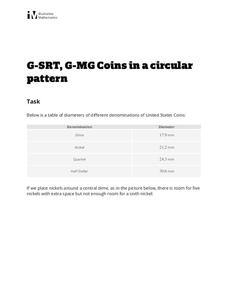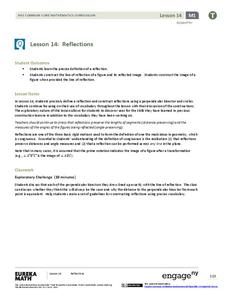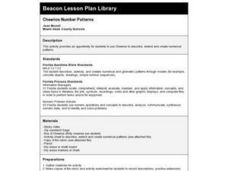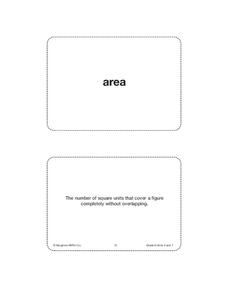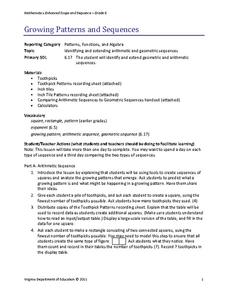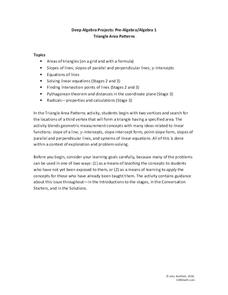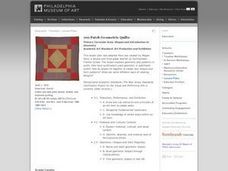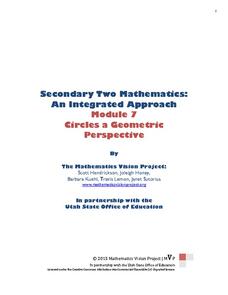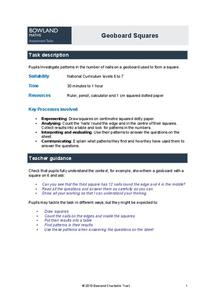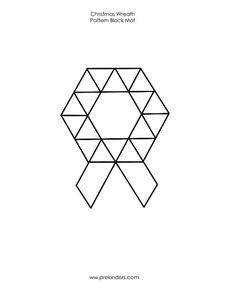Illustrative Mathematics
Coins in a Circular Pattern
What starts as a basic question of division and remainders quickly turns abstract in this question of related ratios and radii. The class works to surround a central coin with coins of the same and different values, then develops a...
EngageNY
Reflections
Facilitate creativity in your math class as individuals learn the definition of a geometric reflection and correctly construct a model, as well as its reflected image. They use a perpendicular bisector and circles to elaborate on...
Curated OER
Talking About Your Name in Math Terms
Add imagination and creativity to your math lesson. Young mathematicians investigate ways to express their names in mathematical terms. For instance, they can count the number of letters, analyze the geometric shapes of the letters, or...
State of Michigan
Pre-K Mathematics
Kick-start children's education with this pre-school math unit. Offering 31 different hands-on learning activities that develop young mathematicians' pattern and shape recognition, basic number sense, and much more, this is a must-have...
National Security Agency
Growing Patterns: Practical Pattern Problems
Your learners explore growing patterns by describing, extending, creating, and evaluating practical pattern problems in this three-day collaborative unit. Beginning with concrete patterns and function tables to extend and describe with a...
Curated OER
Patterns Everywhere!
Learners recognize and demonstrate the patterning of numbers and objects in our environment. They create a pattern using geometric shapes and find a missing number in a sequence.
Curated OER
Cheerios Number Patterns
Young scholars, following a provided worksheet, use Cheerios to explore number patterns.
EngageNY
Algebraic Expressions—The Distributive Property
Do your classes truly understand the distributive property? Use a demonstrative lesson to represent the distributive property in various ways. Learners solidify understanding by creating a geometric pattern for distributive property, and...
CK-12 Foundation
Visual Patterns: Building the Queen's Tower
A resource fit for a queen. Scholars recognize and continue a pattern in towers people are building for a queen. They write and use an algebraic expression for the number of tiles in the towers.
Houghton Mifflin Harcourt
Unit 7 Math Vocabulary Cards (Grade 6)
Thirty-eight flashcards make up a set designed to reinforce math vocabulary. Two types of cards can be found here; a word card in bold lettering, and a corresponding definition card that offers a labeled example. Terms include area,...
West Contra Costa Unified School District
Geometric Sequences
Place a lesson on sequences in your sequence of lessons. Scholars first learn the basics of geometric sequences, such as common ratios and then they write recursive and explicit formulas for geometric sequences.
CK-12 Foundation
CK-12 Middle School Math Concepts - Grade 6
Twelve chapters cover a multitude of math concepts found in the Common Core standards for sixth grade. Each title provides a brief explanation of what you will find inside the chapter—concepts from which you can click on and learn more...
Resources for Early Childhood
Making Math Meaningful and Enjoyable
Your young learners will enjoy mathematics that is meaningful correspondence as they play their way to a deep mathematical foundation. Organized around the math standards, this appropriate sequence of conceptual, preschool...
Pennsylvania Department of Education
Analyzing Numeric and Geometric Patterns of Paper Pool
Students use concrete and pictorial representation of geometric patterns to extend patterns. In this geometric patterns lesson plan, students identify patterns and extend them.
Virginia Department of Education
Growing Patterns and Sequences
Learners explore, discover, compare, and contrast arithmetic and geometric sequences in this collaborative, hands-on activity. They build and analyze growing patterns to distinguish which kind of sequence is represented by a set of data...
Willow Tree
Arithmetic and Geometric Sequences
Old mathematicians never die; they just lose some of their functions. Studying sequences gives scholars an opportunity to use a new notation. Learners write functions to model arithmetic and geometric sequences and use them to find new...
5280 Math
Triangle Area Patterns
Combine algebraic and geometric strategies to find solutions. The task asks learners to find the coordinates of a third vertex of a triangle to create a triangle with a specific area. The project is a set of seven problems that helps...
Curated OER
Create and Analyze Rectangular Patterns
Students explore the concept of geometric patterns. In this geometric pattern lesson, students use Microsoft Excel to explore geometric patterns. Students analyze growth rates of pattern growth. Students create their own patterns and...
Virginia Department of Education
Relationships Round Robin
Mathematics is all about patterns. Young mathematicians analyze geometric patterns to write algebraic expressions. They use the expressions to predict future stages of the patterns.
Curated OER
100 Patch Geometric Quilts
Young scholars identify geometric patterns in quilts. In this geometry lesson, students view various types of quilts and identify the geometric shapes. Young scholars construct one hundred patch paper quilts using geometric shapes.
Mathematics Vision Project
Circles: A Geometric Perspective
Circles are the foundation of many geometric concepts and extensions - a point that is thoroughly driven home in this extensive unit. Fundamental properties of circles are investigated (including sector area, angle measure, and...
Bowland
Geoboard Squares
Don't be a square! Help your budding mathematicians discover patterns within squares. Scholars create squares on geoboards and identify patterns in the number of nails, both nails on the edge of the squares and nails within the squares....
PreKinders
Christmas Wreath Pattern Block Mat
Add some holiday cheer to geometry practice with a Christmas themed pattern block mat in the shape of a wreath.
Curated OER
Math Quilts
Students examine geometric quilt patterns to identify how math may have been used to help slaves escape to freedom. They slide, flip and turn geometric shapes to create a map quilt.


